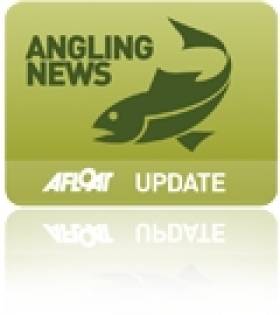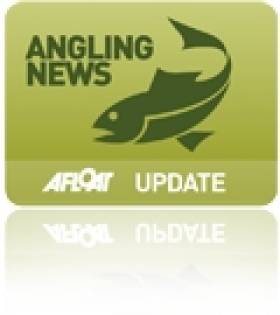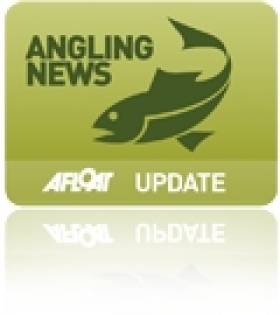Displaying items by tag: disinfection
#Angling - Minister Fergus O'Dowd launched Ireland’s first purpose-built disinfection station for angling enthusiasts at Ballyhoe Lake in Co Cavan on Wednesday 3 April.
The new facility - developed by Inland Fisheries Ireland (IFI) in co-operation with Interreg IVA (CIRB), the Irish Angling Development Alliance (IADA) and the local Meathhill Angling Club - will facilitate the disinfection of angling equipment on entry to the lake, helping to ensure that unwanted alien invasive species and harmful fish pathogens can be kept out of our natural fisheries.
Moreover, the development will also provide a template for further such facilities on fishery watercourses throughout the country.
The disinfection station is located at the entrance to Ballyhoe Lake, a prime Irish specimen tench fishery.
The entrance gate and the disinfection station are secured with combination locks, the numbers for which are available through nominated members of the Meathhill Angling Club (contact numbers for these members are provided on the tank). Members of the club will replace the disinfectant and manage the facility locally, as necessary.
Once opened, the tank contains a disinfection container for boots, keep nets, landing nets and stink bags. Disposable gloves are provided for angler use while disinfecting, and a brush is available to scrub boots, as well as a spray bottle for boats coming onto the lake.
Signage adjacent to and underneath the lid of the tank provides step-by-step instructions for the angler. Once the gear has been disinfected, the anglers apply a tag to his or her net to show that the process has been completed. Different colour tags will be utilised at the discretion of the operators.
Congratulating Meathhill Angling Club and the IADA at the launch, Minister O'Dowd said: "Angling clubs and federations the length and breadth of Ireland are key to the protection of our angling resources. By providing facilities such as this, we are adding to the goodwill and community commitment of Meathhill Angling Club to protect their fishery, while also ensuring access to it.
"This access helps to safeguard the sustainability of our valuable resource which will continue to bring much needed revenue to the local community through responsible angling activity."
The minister added that he "can’t emphasise enough the role anglers and clubs have on the frontline in the fight against invasive species, which supplements the great work in the area carried out by IFI with the support of representative bodies such as IADA."
Minister Launches 'World's First' Angling Kit To Combat Invasive Species
#Angling - The fight to stop the spread of invasive aquatic species in Ireland took to the frontline at the weekend with the launch by Minister Fergus O'Dowd of an Individual Angler Disinfection Kit – the first of its type in the world.
The kits are produced by Inland Fisheries Ireland (IFI) and funded by the CIRB (Controlling Invasives, Restoring Biodersity) INTERREG IVA Project, and were launched at the Ireland Angling Show 2013 on Sunday 17 February.
The kit is available in a durable and convenient kit bag and comprises 20 Virkon Aquatic (50g) tablets; a 500ml plastic trigger spray bottle; disposable gloves; a stiff bristle brush for cleaning boots, etc; a practical instruction manual; invasive species identification cards on a handy key ring; a metal ‘Stop the spread of invasive species’ badge; and an array of useful and relevant invasive species literature.
Now available from IFI, the kit will cover disinfection for up to 20 angling trips, and will help ensure that invasive species are not spread by unsuspecting anglers as they move from one watercourse to another.
In recent years, IFI says it has worked closely with anglers’ federations, clubs and other grouping to ensure that they are aware of the risks posed by aquatic invasive species and of actions that they can take to minimise the risk of introducing or spreading these aggressive and potentially harmful species. Invasive species include aquatic plants, animals (insects and fish) and microscopic pathogens.
The minister said: “Disinfection facilities have been developed by IFI to cater for large groups of anglers attending organised competitions and these have been well received. However, there are many anglers who do not fish competitions and who like to seek the solace of a quite water body where they can test their skills against the resident fish or simply watch a float as it bobbles in the water.
“We want to raise awareness among these anglers and help them in the same way as competition anglers to guard against the introduction or spread of invasive species or harmful pathogens."
Logistically it is impossible to provide disinfection facilities at every watercourse in the country to cater for all of Ireland's anglers, so a different approach was required. IFI says it recognised the long-standing responsibility taken on by anglers to protect and not adversely impact the aquatic habitat or water quality, so it is providing anglers with a portable kit to make disinfection more efficient and cost-effective.
At the show, Minister O'Dowd demonstrated the kit with the assistance of Dr Joe Caffrey of IFI to show how individual disinfection of angler’s equipment and clothing is relatively simple and can prevent highly damaging invasive species such as Asian clam and zebra mussel, and fish pathogens like the salmon fluke Gyrodactylus from being transferred into un-infested water bodies.
The minister commented: "As I meet more and more anglers around the country I am struck by your enthusiasm, knowledge, expertise and environmental responsibility. As a budding angler myself I look forward to using this kit and I know that you will embrace this initiative to ensure that fishing as we know it now can continue and improve under our watch, safe from the introduction of hazardous invasive pathogens, plants and animals."
'No Dip No Draw' Policy for Irish Anglers
Inland Fisheries Ireland has implemented 'no dip no draw' policy for competitive angling to prevent the spread of invasive species in Ireland's inland waters.
The policy, developed by the Irish Angling Development Alliance and endorsed by all affiliated clubs, aims to prevent Irish rivers and lakes coming in to contact with "a wide range of aquatic species of pathigens that could prove harmful to our game, coarse and pike fisheries" and which could "easily and inadvertently be introduced to Irish watercourses through contamination of angling equipment and associated gear".
As a result, disinfection prior to events for any and all angling equipment or tackle that comes into direct contact with fish or water is mandatory.
The IFI provides details for anglers and competition organisers regarding best procedure for implementing the policy in its Code of Practice, currently available online HERE.
































































